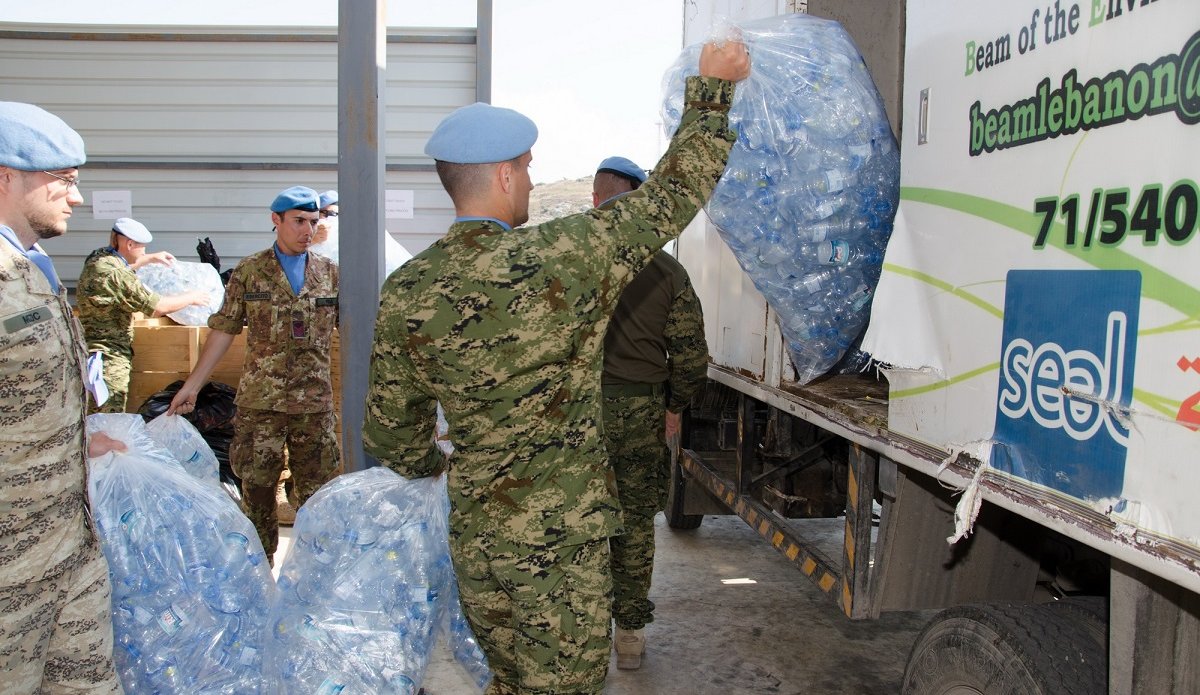UNIFIL strives to ‘beat plastic pollution’
From solar farms and sewage treatment plants in its headquarters in Naqoura to the building of a greenhouse out of recycled plastic bottles in a UNIFIL position near Kafr Chouba in south-eastern Lebanon, UNIFIL peacekeepers have been striving to protect the environment of the communities they serve in south Lebanon.
As World Environment Day is observed globally today, UNIFIL is redoubling its efforts in reducing the environment footprint of its more than 10,500 peacekeepers coming from 42 countries. One of the initiatives is the installation of hundreds of solar panels at its headquarters, generating about 4.5 per cent of the total electricity consumption. In addition, they not only treat the sewage originating from the base, but also the wastewater originating from the Naqoura Municipality. About 2,800 residents of Naqoura are connected to the UNIFIL sewage treatment plant.
In many of the 55 UN positions spread across the 1,060 square kilometre UNIFIL area of operation, between the Litani River and the Blue Line, the peacekeepers have also applied innovative ways to reduce their environment footprint.
While Nepalese peacekeepers have re-purposed single use plastic bottles into plant pots, Indian peacekeepers have built a greenhouse out of recycled plastic bottles. Likewise, Italian peacekeepers recently donated 30,000 single-use water bottles and as many bottle caps, collected over a period of 20 days, to a local non-governmental organization working in the field of environment.
Jihan Shaheen of the UNIFIL Environmental Management Unit says apart from these rather small initiatives, a UNIFIL-contracted company carries out a large-scale waste recycling in Tyre. “We have a contractor that is separating the waste and sending to recycling facilities managed by NGOs, for example, or by private companies,” says Ms. Shaheen. “None of our recyclables are dumped in any landfills in this area.”
Also today, UNIFIL organized a ceremony to mark World Environment Day, with the theme “Beat Plastic Pollution”, at the mission headquarters in Naqoura, with the participation of senior UNIFIL officials, Lebanese environment activists, local officials and fellow peacekeepers. At the ceremony, UNIFIL’s Deputy Force Commander Major General Shivaram Kharel said UNIFIL carries out various environmental activities, including awareness raising on global warming, sustainable consumption and the preservation of the wildlife.
“UNIFIL is committed to decrease the effects of its operations on the environment,” said Major General Kharel. “Let’s pledge to contribute in enhancing the environment where we are deployed by simple actions such as saving water, reducing fuel consumption and CO2 emissions, switching off air conditioners and lights when they are not needed, and by educating those you work with to protect their local environment by stopping the use of plastics.”
An environmental activist and a Lebanese Presidential advisor, Claudine Aoun Roukoz, also addressed the ceremony, noting that UNIFIL peacekeepers work “tremendously” in the field of environment. “As the people, the owners of the land, have embraced these peacekeepers, the latter have embraced in their turn the people’s health and social demands,” she said.
On the occasion, members of the UNIFIL leadership team and Ms. Roukoz handed certificates of appreciation to UNIFIL’s Ghanaian Battalion, Indian Battalion, Nepalese Battalion and Italian Engineering Company for their significant contribution to preserve environment and “beat plastic pollution” in the UNIFIL area of operation.
A UNIFIL staff member, Monita Youssef, enthralled the audience at the UNIFIL ceremony with her song “Pollution Harms Humans.”
-------------------------------------------------------------------------------------------------------
Article: Tilak Pokharel
Video Camera: Aoibheann O’Sullivan
Video Edit: Aoibheann O’Sullivan & Suzane Badereddine
Translation: Adib Al- Moussa
Video Music: Podington_Bear
Stills: Pascual Gorriz
-------------------------------------------------------------------------------------------------------
 UN
UN United Nations Peacekeeping
United Nations Peacekeeping













